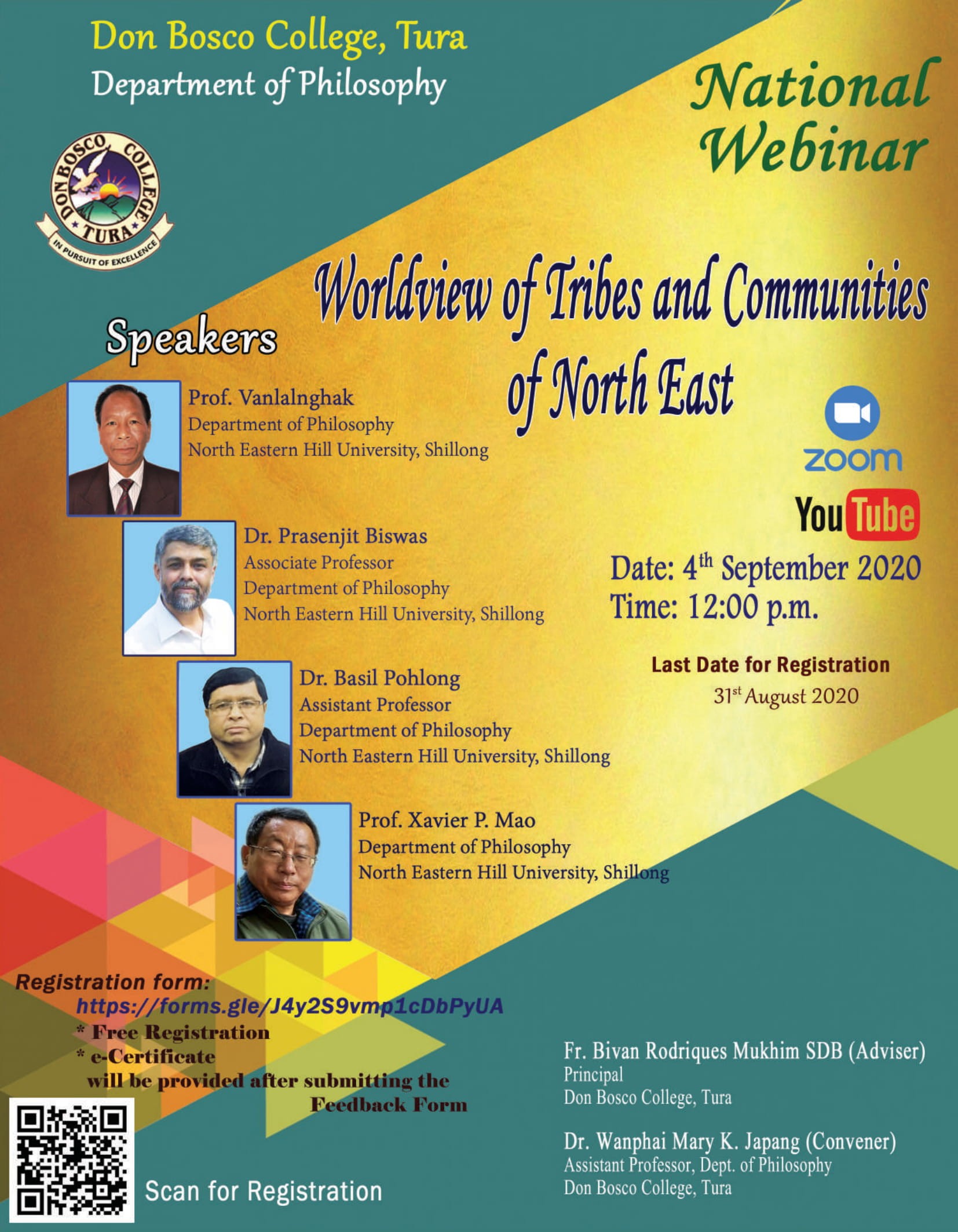
Worldview of Tribes and Communities of North East
On 4th September 2020, the Department of Philosophy, Don Bosco College, Tura organized a National Webinar on “Worldview of Tribes and Communities of North East”. Gracing the occasion were the four esteemed resource persons: Prof. Vanlalnghak, Professor and Head of Philosophy Department, North Eastern Hill University, Shillong, Prof. Xavier P. Mao, Professor of Philosophy Department, North Eastern Hill University, Shillong, Dr. Prasenjit Biswas, Associate Professor of Philosophy Department, North Eastern Hill University, Shillong and Dr. Basil Pohlong, Assistant Professor of Philosophy Department, North Eastern Hill University, Shillong. Also present in the webinar were the Principal and the Vice Principal of Don Bosco College, Tura (Rev) Fr. Bivan Rodriquez Mukhim and (Rev) Fr. Abhilash VJ. Altogether there were 2,295 registered participants worldwide for the webinar. Out of 2,295 registered participants only 600 participants actively participated in the live webinar which was aired on Zoom and YouTube.
The webinar started at 12:00 P. M with a welcome cum introductory speech by Dr. Wanphai Mary K. Japang, Assistant Professor of Philosophy and the convener of the webinar followed by the inaugural address from the Principal of Don Bosco College Tura (Rev) Fr. Bivan Rodriquez Mukhim.
The first session was a presentation on the topic “Worldview of Hmar and Mizo” by Prof. Vanlalnghak. Prof. Vanlalnghak clearly stated that a worldview is essentially an inclusive outlook on life that sum up what we apprehend about the world, how we interpret it emotionally and how we react to it volitionally. He stressed that relationships are crucial and are at the crux of the Hmar and Mizo worldview. Important relationships include the living, the unborn, the corpse and the spirit world. He briefly highlighted some community and marriage relationships and argued that space and time are subservient to relationships. He pointed that tribal people believe in the existence of spirits which pervades, controls and influences all aspects of life. These spirits communicate to human through omen, possession, dreams and vision. He stated traditionally tribal people are tormented by phobia, the spirit of fear totally dominate tribal culture, however, he concluded that with the modern development in many fields, traditional belief like animism has been gradually annihilated.
The second session was a presentation on the topic “Ethical Thoughts and Ideas in Mao Naga Culture: An Exploration” by Prof. Xavier P. Mao. Prof. Mao lucidly stated that the underpinning of ethical thinking in Mao Naga culture does not have systematic ethical systems like western ethics. He highlighted that Mao’s ethical thinking stems from different forms of aphorisms like Rachiithobo Kopfo (Upholding of righteousness), Rashiihra Kopfo (Upholding the path of God’s blessing), Kama Kokhi Kapi (Upholding forgiveness) and also from various traditional practices. Prof. Mao provided several examples of such practices and aphorisms and hence claimed that there are no substantive or essentialist kind of ethical theories among the Mao people which are considered as good by many thinkers like the great contemporary philosopher Jurgen Habermas. He concluded by stating that Mao Naga tribe highly value moral life that even today, these practices are still relevant and effective in preserving moral order in the society. That is why many non – Naga scholars remark that the morality of the Nagas is much higher than their counterpart plain people from mainland India.
The third session was a presentation on the topic “Conceptualizing Tribal Worldview: A Khasi Perspective” by Dr. Basil Pohlong. Dr. Pohlong perspicuously deliberated that tribal worldview is a system in which tribes interpret, evaluate and conceptualize the world around. It is a system or a structure through which we understand how tribes make an intelligible account about itself and the world. He emphasized that conceptualizing tribal worldview involves inquiring and studying all those issues which pertains in what we generally call today as epistemology, axiology, ontology and cosmology. He argued though there is a problem in understanding tribal worldview as it is hidden and embedded in some basis like folktales, stories etc which are orally communicated, nonetheless he concluded that various methods and efforts like analysis and interpretations of the available narratives in the Khasi tradition helps in giving insight about the Khasi worldview as these narratives are repository of knowledge about the Khasi worldview.
The last session was a presentation on the theme of the webinar “Worldview of Tribes and Communities of North East” by Dr. Prasenjit Biswas. In line with the former three speakers, Dr. Prasenjit Biswas stated that NE tribes of India have their own ways of conceptualizing and interpreting reality. He pellucidly deliberated that for NE tribes, reality is a set of experiential relations that is mostly non – anthropocentric experiential relationships. Each community represents a specific “form of life” so referring to Prof. Ludwig Wittgenstein conception of “Language Games”, Dr. Biswas argued that the tribes of NE India can conceptualize, express and describe the world in their own language games. He highlighted that the conceptual framework of tribal philosophy makes tribal philosophers more concerned about entity pluralism and multiculturalism rather than on ontological and metaphysical distinctions. He opined that tribal philosophies with their own conceptual frameworks are by themselves important systems of Philosophy but the question whether there is a possibility to exclude or to include Tribal Philosophy from and within the domain of Indian Philosophy remains an open ended question.
In each session, questions of the participants to the respective resource persons were answered delightfully by them. In a nutshell, the webinar was an enlightening, enriching, insightful and informative session as the presentations and deliberations of all the resource persons provided us an idea to study and to understand the worldview and culture of tribal communities.
The webinar ended with a vote of thanks delivered by Ms. Friangky M. Marak , Assistant Professor of Philosophy, Don Bosco College, Tura.

